The Hollow City Read online
The author and publisher have provided this e-book to you without Digital Rights Management software (DRM) applied so that you can enjoy reading it on your personal devices. This e-book is for your personal use only. You may not print or post this e-book, or make this e-book publicly available in any way. You may not copy, reproduce or upload this e-book, other than to read it on one of your personal devices.
Copyright infringement is against the law. If you believe the copy of this e-book you are reading infringes on the author’s copyright, please notify the publisher at: us.macmillanusa.com/piracy.
To Janci Patterson.
When I was ready to throw this book away, she convinced me it was worth saving, and then she showed me how to save it.
ACKNOWLEDGMENTS
As with all novels, this one owes a great deal to a great many people. First are my professional accomplices: my agent, Sara Crowe; my editor, Moshe Feder; my in-house advocate, Paul Stevens; and my publicist, Alexis Saarela. Without their work on this and all of my previous novels, The Hollow City would still be a poorly written file on my hard drive.
Great thanks also go to my writing group and various other readers, who helped shepherd the early versions of this book from “Dan’s weird imagination” to “something people actually want to read.” In no particular order: Brandon and Emily Sanderson, Peter and Karen Ahlstrom, Ben and Danielle Olsen, Alan Layton, Ethan Skarstedt, Kaylynn Zobell, Janci Patterson, Steve Diamond, Nick Dianatkhah, Will Groberg, and Rob Wells.
Special thanks go to Dawn Wells, my wonderful wife and the best support I could ever ask for, and to Philip K. Dick, who I gave up trying to emulate but who continues to inspire me. When the world makes sense it’s because of her, and when it doesn’t I think of him.
CONTENTS
Title Page
Dedication
Acknowledgments
Epigraph
Prologue
Chapter 1
Chapter 2
Chapter 3
Chapter 4
Chapter 5
Chapter 6
Chapter 7
Chapter 8
Chapter 9
Chapter 10
Chapter 11
Chapter 12
Chapter 13
Chapter 14
Chapter 15
Chapter 16
Chapter 17
Chapter 18
Chapter 19
Chapter 20
Chapter 21
Chapter 22
Chapter 23
Chapter 24
Chapter 25
Chapter 26
Chapter 27
Chapter 28
Chapter 29
Epilogue
Tor Books by Dan Wells
About the Author
Copyright
Oh dreadful is the check—intense the agony—
When the ear begins to hear, and the eye begins to see;
When the pulse begins to throb, the brain to think again;
The soul to feel the flesh, and the flesh to feel the chain.
—EMILY BRONTË, “The Prisoner”
PROLOGUE
AGENT LEONARD KNELT DOWN by the body, carefully lifting his coat up out of the blood.
“Do we know his name yet?”
Agent Chu shook his head. “Nametag says Woods, but ChemCom has a lot of janitors and the guy who found him didn’t recognize the name. Visual ID is, obviously, impossible.” He gestured at the police officer standing beside him. “Chicago PD is interviewing the night watchman, we’re hoping he knows.”
Leonard surveyed the body carefully: two bullet holes in the chest, trauma to the back of the head, and nothing but a shattered, bloody mess where the face should be. Just like all the others. He pulled on a rubber glove and touched the head carefully, rolling it upright for a better view of the wound. “This definitely looks like our guy,” said Leonard, releasing the head back into place. He probed the corpse’s bloodstained coveralls with a gloved finger, and cocked his head in surprise when he found a hole in the sleeve. “What’s this?”
Agent Chu crouched down to look over his shoulder, and Leonard opened the tear. There was more blood inside.
“He’s got a wound on his arm,” said Leonard. “Probably the same slash that opened the sleeve.”
Chu raised an eyebrow. “Cool.”
The officer behind them cleared his throat. “Excuse me?”
“Sorry,” said Chu, “I’m not trying to be insensitive, it’s just that … well, the Red Line Killer’s been virtually untrackable so far. He’s too careful. None of his victims have ever had the chance to fight back before, but these kinds of wounds—knife cuts on the forearms—are probably defensive, which means he saw the attacker coming.” He shrugged. “Probably.”
“That’s an awful lot of probablies,” said the officer.
Agent Leonard stepped over the body to examine the other arm. “Yeah, similar thing over here. Victim almost lost a finger.” He looked up at Chu. “This guy definitely fought back.”
Chu looked down the hallway, taking stock of the angles. “This corner was probably the ambush point—victim comes around the edge, Red Line’s waiting with a gun, boom. Two in the chest, then go to work on the face, or at least we assume that was the plan. That’s how he’s done all the others. Why didn’t it work this time?”
Leonard peeled off his gloves. “The defensive wounds would come first, which means the knife hit before the gun. Maybe he couldn’t pull it out in time?”
“But if he was lying in wait he would have had it out already,” said Chu. He walked the few steps to the end of the hall, his shoes tapping lightly on the concrete floor. “See? My footsteps were audible, and it’s not even quiet in here. In the middle of the night, without a whole forensics team in the background, they would have been pretty loud.”
“So the victim comes this way,” said Leonard, walking toward Chu, “approaches the corner, and the Red Line Killer lashes out with a knife; the victim fights him off, runs back the way he came.…” He paused, looking at the floor. “Except there’s no blood here, only back by the body.”
“And the shots are in the chest,” said Chu, “not the back. We’re going to need the whole team in here to figure out how this fight went down—kinetics, blood splatter, everybody.”
“Or you could just ask the rent-a-cop,” said the policeman, pointing down the hall. “Looks like ChemCom has security cameras.”
Chu and Leonard looked where he was pointing, following his eye-line to a small glass bubble on the far wall.
“You’ve got to be kidding me,” said Leonard. “He’s never been on camera before.”
“You think the camera works?” asked Chu. “The body was found by another janitor, not a security team watching on a monitor.”
“This hallway looks like it’s just storage,” said the policeman, glancing at the wide, evenly spaced doorways. “The cameras probably don’t even go to a live feed, just a hard drive somewhere to keep a record of who’s been in and out.”
“This is huge,” said Leonard. “We’ve never even caught a glimpse of this guy before—he’s too careful. If we’ve got him on film … This is huge.”
Chu nodded and started off down the hallway. “Then let’s stop talking about it and find the tapes.”
The night watchman was in the main ChemCom lobby with the remaining janitors, giving statements to the local police. Chu and Leonard listened in—the man knew nothing, or claimed to—and then walked him into the security office to look at the tapes.
“When do you think it happened?” the watchman asked, pulling up the security footage.
“Around one o’clock, one-fifteen,” said Leonard.
“Just play the whole thing on fast-forwa
rd,” said Chu, “and stop when you see people.”
The man nodded, loaded the file, and the long, empty hallway appeared on the screen in black and white. He clicked fast-forward and the time code in the corner started racing, but nothing else changed. The man accelerated the fast-forward, then again, until suddenly a dark shape shot across the screen in a blur and exploded in a flash of light. The three men swore in unison. The image collapsed into fuzzy snow, as if the signal had been completely lost.
“Back it up,” said Leonard, peering closely at the screen. The watchman reversed the video, found the janitor’s first entrance, and hit play. He pointed at the time code.
“One-thirteen. You guys are good.”
“Quiet,” said Chu.
There was a burst of static on the screen, as if the signal died and came back just for an instant, and then the janitor came into view beneath it, walking toward the far corner. He stopped at a door, fiddled with the lock, then continued on.
“That’s Brandon all right,” said the watchman.
“You know him?” asked Leonard.
“Not very well,” said the watchman. “He’s not exactly a talkative guy, but I’m the one that has to check him in every night. Name’s Brandon Woods, lives … outside the city somewhere.”
Leonard and Chu glanced at each other, then looked back at the screen.
Brandon Woods continued down the hall to the far corner, but just before he reached it, he stopped abruptly and clutched his head, as if he’d come down with a sudden, unbearable migraine. His lips moved, but the recording had no sound, and the image was too small to make anything out. He retreated several steps toward the camera, still clutching his head and screaming.
“Has your company done any recent drug testing?” asked Agent Leonard.
“Once a year,” said the watchman, “but it’s different for every employee, on a randomized schedule. You think Brandon’s on drugs?”
“I don’t think anything yet,” said Leonard. “I’m just collecting information.”
Brandon Wood’s pain seemed to ease as he moved backward, and just then another figure stepped around the corner—a man all in black, a ski mask pulled over his face, and a gun in his hand. Agent Leonard’s breath caught in his throat: this is the man we’ve been hunting. He raised the gun to fire, the janitor saw him, and suddenly the image flickered—once, twice—and the space between Woods and the attacker seemed to ripple. The attacker staggered back, dropping the gun, as if the ripple had shoved him against the far wall.
“What on Earth?” whispered Chu.
The attacker staggered to his feet, reaching for his gun, but Woods was running toward him and he didn’t have time. The man planted his feet, bracing for impact, and right before Woods reached him a jagged bolt of light leapt out between them, bridging the gap between the two bodies like an electrical arc. The man in black shook as it struck him, but shoved the janitor away and pulled a long hunting knife from a sheath on his belt. The janitor regained his footing, squaring off against his attacker, and once again the screen flickered and a ripple of distortion flew across the hall—not directionally, like the first time, but everywhere, emanating out from the janitor like a wave. It struck the attacker almost instantly, and his body shook with the contact; a second later the wave reached the camera, the image exploded in light, and the feed collapsed once more into static and snow.
The three men stared at the screen in silence. After a long moment Agent Chu spoke.
“What was that?”
“Well,” said the watchman, hesitating, “obviously, it was a janitor shooting a serial killer with his mind. That … that seemed pretty clear to everyone else, right?”
Agent Leonard flipped open his badge and held it in front of the watchman’s face. “I’m showing you this to remind you how serious I am when I tell you that everything you’ve seen in this room tonight is a state secret. We’re confiscating the file, the camera, and any and all backups that may exist. You do not say anything to anybody at any time. Am I clear?”
The watchman swallowed nervously and nodded his head. Agent Chu leaned forward, grabbed the mouse, and rewound the video. He froze it on an image of the man in black, knife in hand, crouched at the end of the hall. He stared at the man intently.
On the screen, the man stared back.
ONE
“WHO ARE YOU?”
I’m in a hospital bed; I can tell by the rails on the sides, and by the white coats on the people gathered around me. Their heads are haloed by bright fluorescent lights, still indistinct as I struggle to wake up. There’s a needle in my elbow, an IV tube reaching out behind me. I feel nauseous and slow, and the light burns my eyes. How did I get here? Where’s Lucy?
“You’re awake,” says one of the men, “good, good. You gave us quite a scare, Mr. Shipman.”
He knows my name. I stare at the man, forcing my eyes to focus. He’s older, sixties maybe, in a long, white hospital coat. Two other men and one woman stand by him, probably also doctors, pressed around my bed. There’s a guard by the door—a guard? Or just an orderly? I don’t know what’s going on.
My throat is dry and I struggle to talk. “Why don’t I remember coming here?”
“My name is Dr. Murray,” he says. “You had a fall—do you remember falling?”
Do I remember anything? I remember hiding out, and then … a chase? Someone found me. Yes, I’m sure of it; I remember running. And there was an empty city, full of empty houses, and a deep, dark hole, like a well or a mine shaft.
The people I was running from were bad—that much I know. Did they catch me? Are these doctors part of it? I slow down and try to think.
“Where’s Lucy?”
“Who?”
“Lucy, my girlfriend, she was with me in the … where was I?”
“What do you remember?”
“I remember a pit,” I say slowly, watching their faces. “I fell down a pit.”
Dr. Murray frowns; he thinks I’m wrong. Am I? But I remember a pit, and he said I had fallen, and … My head aches—not just my head, my mind aches. Dr. Murray leafs through a slim folder, holding up a page to read the one below it. “You fell, or jumped, out of a window. Do you remember that?”
I say nothing, trying to remember. Think, Michael, think!
“We were worried you’d hurt yourself,” says one of the other doctors, “but nothing’s broken.”
“If he’s lost his memory,” says the woman, “he might have hit his head harder than we thought.”
I scan my eyes around the room, trying to get a better sense of where I am—a regular hospital room, with cabinets and curtains and hand sanitizers lining the walls. No computers that I can see. Good.
“We would have seen more damage to his head,” says another doctor. “The abrasions were grouped on his legs and arms—he landed about as well as you could hope to.”
“Mr. Shipman,” says Dr. Murray, catching my eye and smiling. “Michael. Can you tell us where you’ve been for the past two weeks?”
I frown, my suspicions rising. I’d been trying to disappear, and I think I thought I had, but now I’m in here, surrounded by prying eyes and equipment. I shift my legs imperceptibly, testing for restraints under the covers. It doesn’t feel like they’ve tied me down. They might just be normal doctors—they might not be part of the Plan. Just helpful doctors who don’t know who I am or who’s after me. Maybe I can still get away.
Maybe I can, but not with five people between me and the door. I need to take my time.
“We’re only trying to help you, Michael.” The doctor smiles again. They always smile too much. “Once we knew who you were and we looked up your file, well, you can imagine that we started to wonder.”
I stare at him, my eyes cold. So they do know who I am, or at least part of it. I start to tense up, but I force myself to calm down. Just because they know who I am, that still doesn’t mean they know about the Plan. “No,” I say firmly, “I can’t imagine.” The men I
was running from had been watching me for years—if they gave the doctors their file, they’ll know everything about me. I shift my legs again, bracing myself to bolt for the door if I have to make a move. “What does the file say?”
He raises the folder in his hands, an old manila folder with a curling green sticker on the tab. “Standard things,” he says. “Medical history, hospital stays, psychological evaluations—”
“Wait,” I say. “Is that it? It’s just a medical history?”
Dr. Murray nods. “What else would it be?”
“Nothing.” So they don’t have the real file, just the fake one from the state. That’s good, but it could cause problems of its own. “None of that stuff matters.”
The doctor glances at the man beside him. “We’re doctors, Michael, it matters a great deal to us.”
“Except that it’s all false,” I say. I know I can trust them now, but how can I explain what’s going on? “The state file was created…” It was created by Them, by the people who’ve been following me. Except I’m too smart to tell the doctors a truth they’ll never believe. I shake my head. “It was created as a joke,” I say. “It doesn’t mean anything.”
Dr. Murray nods again. “I see.” He flips to a page in the file. “Ongoing treatment for depression and generalized anxiety disorder.” He turns the page. “Two weeks in Powell Psychiatric Hospital, fourteen months ago.” He turns the page. “Multiple prescriptions for Klonopin, paid for by state welfare.” He looks up. “You say this is all part of a joke?”
How am I supposed to explain this to him without looking crazy? I close my eyes, feeling the early flutters of a nervous panic. I roll my hands into fists and take a deep breath: it’s okay. They’re not part of the Plan. They don’t even have me tied down. I can probably walk right out of here if I can just find a way to defuse their suspicions. I glance around again; no computers, and the TV’s off. I might be okay.
“It’s just the … state doctors,” I say. “You need to talk to my personal doctor, my family practitioner. Dr. Ambrose Vanek. He can straighten this out.”

 Partials
Partials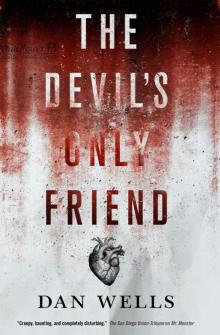 The Devil's Only Friend
The Devil's Only Friend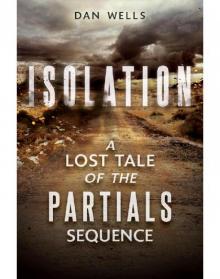 Isolation
Isolation I Don't Want to Kill You
I Don't Want to Kill You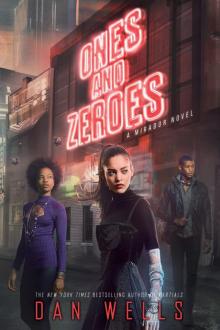 Ones and Zeroes
Ones and Zeroes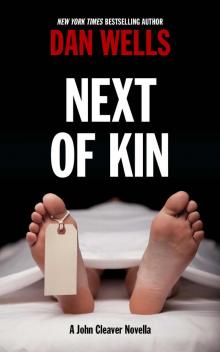 Next of Kin
Next of Kin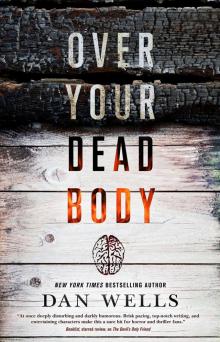 Over Your Dead Body
Over Your Dead Body Fragments
Fragments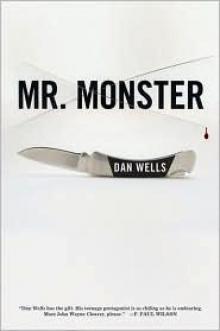 Mr. Monster
Mr. Monster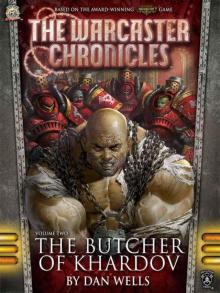 The Butcher of Khardov
The Butcher of Khardov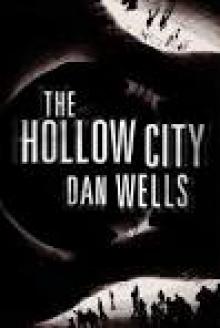 I AM NO T A S E RI AL KI L L E R
I AM NO T A S E RI AL KI L L E R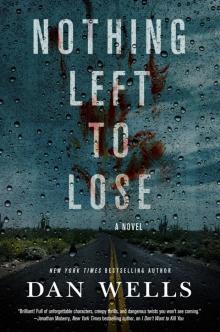 Nothing Left to Lose--A Novel
Nothing Left to Lose--A Novel Active Memory
Active Memory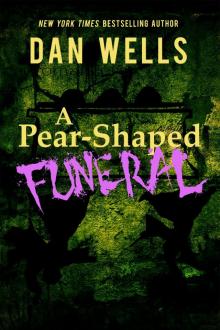 A Pear-Shaped Funeral
A Pear-Shaped Funeral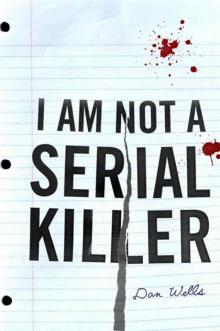 I Am Not a Serial Killer
I Am Not a Serial Killer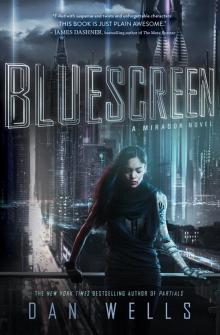 Bluescreen
Bluescreen Ruins
Ruins Zero G
Zero G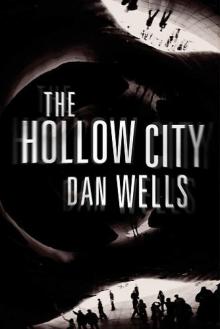 The Hollow City
The Hollow City Extreme Makeover
Extreme Makeover Partials p-1
Partials p-1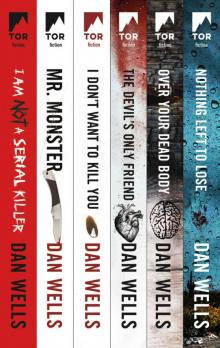 The Complete John Wayne Cleaver Series: I Am Not a Serial Killer, Mr. Monster, I Don't Want to Kill You, Devil's Only Friend, Over Your Dead Body, Nothing Left to Lose
The Complete John Wayne Cleaver Series: I Am Not a Serial Killer, Mr. Monster, I Don't Want to Kill You, Devil's Only Friend, Over Your Dead Body, Nothing Left to Lose